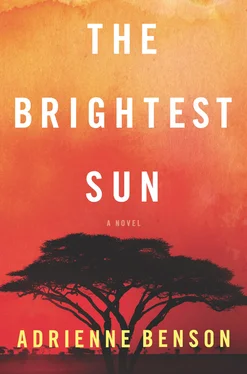An illuminating debut following three women in sub-Saharan Africa as they search for home and family
Leona, an isolated American anthropologist, gives birth to a baby girl in a remote Maasai village and must decide how she can be a mother, in spite of her own grim childhood. Jane, a lonely expat wife, follows her husband to the tropics and learns just how fragile life is. Simi, a barren Maasai woman, must confront her infertility in a society in which females are valued by their reproductive roles. In this affecting debut novel, these three very different women grapple with motherhood, recalibrate their identities and confront unforeseen tragedies and triumphs.
In beautiful, evocative prose, Adrienne Benson brings to life the striking Kenyan terrain as these women’s lives intertwine in unexpected ways. As they face their own challenges and heartbreaks, they find strength traversing the arid landscapes of tenuous human connection. With gripping poignancy, The Brightest Sun explores the heartbreak of loss, the struggle to find a sense of belonging and the surprising ways we find our family and home.
ABOUT THE AUTHOR
ADRIENNE BENSON’s earliest memories include roasting green mangoes over bonfires in Lusaka, Zambia; climbing walls to steal guavas from the neighbors; and riding in the back of a VW van for weeks on end, watching her mom and dad navigate African border crossings and setting up campsites among thieving monkeys and vocal lions. A USAID worker’s daughter, she grew up traversing sub-Saharan Africa, finding homes in Zambia, Liberia, Kenya and Côte d’Ivoire. At sixteen, she made the hardest border crossing of all—the one that brought her “home” to America—a country she barely knew. She’s been a Peace Corps volunteer in Nepal, lived in Ukraine and Albania, slept in more airports than she can count and is now happily ensconced in Washington, DC, with her three kids. Her writing has appeared in Buzzfeed; the Foreign Service Journal; Brain, Child; the Washington Post; the Huffington Post; ADDitude magazine; and several anthologies. The Brightest Sun is her first novel.
The Brightest Sun
Adrienne Benson


An imprint of HarperCollins Publishers Ltd
1 London Bridge Street
London SE1 9GF
First published in Great Britain by HQ in 2018
Copyright © Adrienne Benson 2018
Adrienne Benson asserts the moral right to be identified as the author of this work.
A catalogue record for this book is available from the British Library.
This novel is entirely a work of fiction. The names, characters and incidents portrayed in it are the work of the author’s imagination. Any resemblance to actual persons, living or dead, events or localities is entirely coincidental.
All rights reserved under International and Pan-American Copyright Conventions. By payment of the required fees, you have been granted the non-exclusive, non-transferable right to access and read the text of this e-book on-screen. No part of this text may be reproduced, transmitted, down-loaded, decompiled, reverse engineered, or stored in or introduced into any information storage and retrieval system, in any form or by any means, whether electronic or mechanical, now known or hereinafter invented, without the express written permission of HarperCollins.
Ebook Edition © March 2018 ISBN: 9781474083638
My parents, who cracked the world open for me so stories could spill out. My brother, who somehow made them all seem funny. And TCKs everywhere, who grow wild in the spaces between. This is for you.
Contents
Cover
Back Cover Text
ABOUT THE AUTHOR
Title Page
Copyright
Dedication
PART I
FROM A DIFFERENT TRIBE
A WOMAN LIKE A WILDERNESS
WATER IN A DRY PLACE
NAROK
JUJU
GOD IS THE RAIN, GOD IS THE SKY
CHILDREN BECOME THEMSELVES
SOLAI VALLEY
CHILDREN ARE THE BRIGHT MOON
THE BAOBAB IN SOLAI
PART II
KHAMSA
RIPTIDE
NAKURU
FOREST OF THE LOST CHILD
JACARANDA
BUFFALO
GIRL IN THE SHAPE OF AFRICA
PART III
MOFFAT’S WIFE
A ZEBRA TAKES ITS STRIPES WHEREVER IT GOES
CAPTIVITY
A FATHER, FOUND
Behind the Book: How Nostalgia Brought The Brightest Sun to Life
ACKNOWLEDGMENTS
About the Publisher
PART I
FROM A DIFFERENT TRIBE
One of the old women severed the umbilical cord and passed the tiny body, slippery and warm, up into Leona’s arms. It felt unnatural to hold the baby; the infant seemed too small somehow, almost weightless. Leona rolled carefully onto her side and settled the baby next to her. The brand-new hands splayed and stretched blindly in the dim air. Dust motes floated in the crack of light coming through the one palm-sized window cut from the mud walls. Leona watched as the dust swirled. She wished she had a bigger window. She craved light and air. For the first time in the almost twelve months she’d been in Kenya, she yearned for things she’d left home in America. She wanted clean lines and shiny surfaces, nurses in sensible shoes and the comfort of hospital machinery whirring and clicking and dripping around her. For a minute, she even wanted her mother.
The small body wiggled beside her and a sound came out—staccato like the bleating of a newborn goat. It was a tenuous sound, hesitant, an experiment with an uncertain outcome. The tiny lips pursed in anticipation of what only Leona could give. It was a girl, Leona saw. She squeezed her eyes against the coming tears and tried to roll over onto her stomach. She wanted to bury her face in darkness. She was so tired. She felt a sob in her throat and then a sound filled the dark room. It was her scream, she understood, although she couldn’t feel her mouth opening or the reverberation of air. She only heard the sound of keening fill the space around her head and saw Simi and the Maasai attendants jerk their faces up and look at her, then glance at one another, concerned. Simi reached across the baby’s back to take Leona’s hand, but Leona shook her friend off and brought her hands to her face. She tried to press them over her mouth tightly enough to stop the sound. Her insides were glass, shattering in the shell of her skin. This baby was born of loneliness—the desperate kind that arises in people who live among foreigners; who don’t share language or gestures.
* * *
Leona arrived at the manyatta in a little, dented Renault 4 she purchased, with cash, from a departing French expatriate who she’d met her first night in Nairobi. She drove the distance between Nairobi and Loita hesitantly. It was her first time in Africa and the small car didn’t feel like it would offer protection from lions or elephants or any other wild game that might lurk in the yellow savannah grassland she drove through. The drive terrified her so much that she promised herself to stay in the manyatta and only use the car for emergencies. But after a few weeks the dry dust made Leona’s skin itch, and the nearest water source, a little tributary of the Mara River, was low and thick, too muddy to bathe in. Leona didn’t miss much from home, but she did miss the feeling of a shower, the water soaking her hair and skin. She couldn’t stand the way her skin felt, the way her body stank. She wanted a hot shower. She wanted to immerse herself in soap and water, to scrub her hair and fingernails and wash the spaces between her toes. Her yearning to be clean was visceral.
So, only six weeks after her arrival, she packed an overnight bag and drove to Narok to spend the night at the Chabani Guest House. The hotel was small and cheap, mostly used by safari guides and the occasional shoestring tourist or traveling Peace Corps volunteer. But it was clean, and with electricity, running water and a real, if old, mattress, it felt luxurious to Leona. The sky outside was darkening and cool when she arrived. The purple dusks in Kenya were short; night came quickly. Leona turned on all the lights in her room, and laughed at how easily they flicked into brightness. The manyatta had no electricity. After she scrubbed the dirt from her skin and scalp and stood under the warm, rusty water until it ran cold, she dressed in clean clothes, the one set she hadn’t worn yet, saved in the bottom of her suitcase. Until now, she’d only smelled it occasionally. The scent of the American detergent lingered in the fibers and reminded her of home.
Читать дальше













